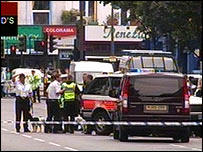
In the late 1980s I read 22 year-old William Dalrymple’s book ‘In Xanadu: A Quest’, a story of his memorable journey across Asia to the ruins of Coleridge’s ‘stately pleasure dome’ in Xanadu (modern day Duolon for pedantics). Over the years I managed to keep up with some of Dalrymple’s writings, such as ‘City of Djinns’ and ‘The Age of Kali’, but I must confess that even though I bought a copy of his ‘White Mughals’ two years ago, it remains in a pile of books still waiting to be read. But read they shall be.
On a philosophical level I maintain that quality writers know more about the ‘state of human condition’ than self-proclaimed experts of society such as politicians, historians, economists, journalists and sociologists. The reality of 19th century London or Russia, I believe, is better captured by reading the likes of Dickens and Tolstoy than by dredging through dreary statistics or dense historical tomes. Similarly truthful authenticity of 20th century Columbia and Egypt are better revealed by Gabriel Garcia Marquez and Naguib Mahfouz than by trolling through a host of non-fiction works.
Having said all this, I come back to William Dalrymple, who has spent his investigative years in both the East and the West. To me he has a better understanding of social realities than a truck full of professional newspaper columnists.
Here then is an excerpt of an erudite article he recently wrote for The Guardian
But it is now becoming very clear that producing cannon-fodder for the Taliban and graduating local sectarian thugs is not at all the same as producing the kind of technically literate al-Qaida terrorist who carried out the horrifyingly sophisticated attacks on the World Trade Centre. Indeed, there is an important and fundamental distinction to be made between most madrasa graduates - who tend to be pious villagers from impoverished economic backgrounds, possessing little technical sophistication - and the sort of middle-class, politically literate, global Salafi jihadis who plan al-Qaida operations around the world. Most of these turn out to have secular scientific or technical backgrounds and very few actually turn out to be
madrasa graduates.
The men who planned and carried out the Islamist attacks on America were confused, but highly educated, middle-class professionals. Mohammed Atta was a town planning expert; Ayman al-Zawahiri, Bin Laden's chief of staff, is a paediatric surgeon; Omar Sheikh, the kidnapper of Daniel Pearl, is the product of the same British public school that produced the film-maker Peter Greenaway.
Peter Bergen of Johns Hopkins University recently published the conclusions of his in-depth study of 75 Islamist terrorists who had carried out four major anti-western attacks. According to Bergen, "53% of the terrorists had either attended college or had received a college degree. As a point of reference, only 52% of Americans have been to college." Against this background, the backgrounds of the British bombers should not come as a surprise. The French authority on Islamists, Gilles Kepel, has arrived at a similar conclusion. The new breed of global jihadis, he writes, are not the urban poor of the third world - as Tony Blair still claims - so much as "the privileged children of an unlikely marriage between Wahhabism and Silicon Valley". Islamic terrorism, like its Christian predecessor, remains a largely bourgeois endeavour.
It is true that there are exceptions to this thesis. There are several examples of radical madrasa graduates who have become involved with al-Qaida. Maulana Masood Azhar, for example, leader of the banned Islamist group Jaish-e-Muhammad, originally studied in the ultra-militant Binori Town madrasa in Karachi.
By and large, however, madrasa students simply do not have the technical expertise or conceptual imagination necessary to carry out the sort of attacks we have seen al-Qaida pull off in the past few years. Their focus, in other words, is not on opposing the west - the central concern of the Salafi
jihadis - so much as fostering what they see as proper Islamic behaviour at home.
All this highlights how depressingly unsophisticated the debate about the British bombers is in this country. Again and again we are told that terrorism is associated with poverty and the basic, Qur'anic education provided by madrasas. We are told that the men who carry out this work are evil madmen with whom no debate is possible and who, according to Frank Field on last week's Question Time, "aim to wipe us out". All links with Iraq and Afghanistan are vehemently denied.
In actual fact, al-Qaida operatives tend to be highly educated and their aims clearly and explicitly political. Bin Laden, in his numerous communiques, has always been completely clear about this. In his first public statement, "A declaration of war against the Americans", issued in 1996, he announced he was fighting US foreign policy in the Middle East and, in particular, American support for the House of Saud and the state of Israel. His aim, he stated, is to unleash a clash of civilisations between Islam and the "Zionist crusaders" of the west, and so provoke an American backlash strong enough to radicalise the Muslim world and topple pro-western governments.
Bush has fulfilled Bin Laden's every hope. Through the invasion of secular Ba'athist Iraq, the abuses in Abu Ghraib, the mass murders in Falluja, America - with Britain's obedient assistance - has turned Iraq into a jihadist playground while alienating all moderate Muslim opinion in the Islamic heartlands and, crucially, in the west. Of course, we must condemn the horrific atrocities these men cause; but condemnation is not enough. Unless we attempt to understand the jihadis, read their statements and honestly analyse what has led these men to blow themselves up, we can never defeat them or even begin to drain the swamp of the grievances in which they continue to flourish.


No comments:
Post a Comment